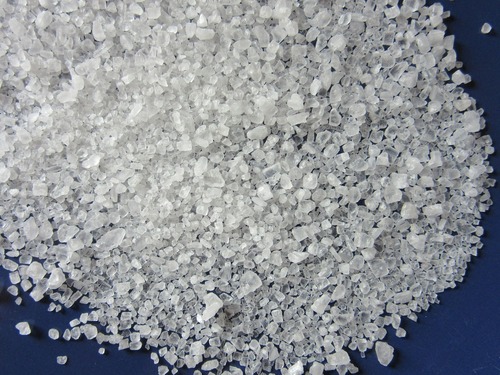Short answer
You need sodium (salt) to carry out many bodily functions, however, excessive consumption of sodium can increase the risk of certain health problems. The American Heart Association recommends people limit daily consumption to 1,500 milligrams.
A fairly even ratio of beneficial and harmful qualities. Moderation is important. Very general topics that can lean towards both sides of the spectrum will be placed here as well. Rice, for example, can be good or bad depending on the type.
View Full Grading System
Category 'A'
Very healthy and numerous health benefits. Side effects are rare. Things rated an 'A+' are typically necessary for survival (for example, water).
Very healthy and numerous health benefits. A few harmful qualities may be associated, but only under certain circumstances such as an allergic reaction.
Very healthy and numerous health benefits. Harmful qualities may be associated, but aren't usually serious.
It is important to note that even the best things in life can become bad in immoderate amounts. So, although something may be rated an 'A+', overconsumption/overdoing can bring unwanted effects.
Category 'B'
Very beneficial to your health. Things rated a 'B+' may have a few harmful qualities to pay attention to.
Overall beneficial to your health. Things rated a 'B' may have some harmful qualities to pay attention to.
More beneficial to your health than not. However, harmful qualities are most likely associated and shouldn't be overlooked.
The main difference between category 'A' and category 'B' is the harmful qualities typically present in 'B' items. Serious side effects are usually uncommon, but are still possible and should be taken note of.
Category 'C'
Both beneficial and harmful qualities associated. Things rated a 'C+' are typically a bit more on the beneficial side. Still, moderation is important.
A fairly even ratio of beneficial and harmful qualities. Moderation is important. Very general topics that can lean towards both sides of the spectrum will be placed here as well. Rice, for example, can be good or bad depending on the type.
More harmful than beneficial. Side effects are common, especially when consumed/done excessively. Moderation is very important.
Category 'C' usually denotes to both good and bad qualities. When it comes to this category, it is important to keep this word in mind: moderation.
Category 'D'
Harmful to your health. Although benefits may be associated, the bad most likely outweighs the good. Moderation is very important.
Harmful to your health. A few benefits may be associated, but the bad outweighs the good. Moderation is extremely important.
Harmful to your health. Very few, if any, benefits are present. Things in this category should be avoided as much as possible.
Category 'D' is typically for things that are more harmful than beneficial. While consuming/doing something unhealthy once in a blue moon shouldn't hurt, we definitely recommend eliminating 'D' items as a regular part of your routine/diet.
Category 'F'
Category 'F' is for things that fail to bring anything beneficial to the table, and are very harmful to your health. We recommend completely avoiding anything in this category. Long-term side effects of 'F' items are usually very serious.
Category 'N'
'N' stands for neutral. Things placed into this category are generally (a) neither good nor bad for you, or (b) lack the necessary evidence to reach any conclusions.
Long answer
As humans, sodium is a necessary part our diet. It participates in numerous cell processes such as the sodium-potassium pump, nerve and muscle function and maintaining blood pressure and volume. The amount of sodium you need to consume actually varies by age with adequate limits of 1,500 mg for up to 50 years old and decreasing as you get older. Here’s the thing – you don’t need to try to add sodium to your foods to get enough. If your diet includes processed foods, you’re getting more than enough, probably even too much sodium in your diet. Actually, if you cut all processed foods out of your diet and only ate whole foods, you would still get enough sodium in your diet.
Too much sodium in the diet can lead to various health concerns with the number one being hypertension or high blood pressure. Blood pressure rises because salt causes fluid retention in the body, which increases the pressure exerted by the blood against blood vessel walls. The process of salt raising blood pressure is natural of course, in small doses, even maintaining a normal pressure over time. In the long run, however, high blood pressure can lead to heart disease, heart attack or stroke if untreated. Studies have also shown that excess salt may cause kidney damage with or without the presence of high blood pressure.
Sodium is an electrolyte that directly works with potassium, only inversely. That is to say that if your sodium levels are too high, your kidneys will trigger the excretion of potassium in order to maintain homeostasis. Low potassium can cause symptoms such as a weak or tired feeling, cramping in the extremities, constipation, heart palpitations, and abdominal pain and bloating.
Calcium works somewhat similarly to potassium in relation to the salt intake. Increased salt causes calcium to be excreted by the kidneys and if there isn’t enough in the blood to make the balance, your body takes it from its next best option – the bones. If you maintain this diet of high salt, you’re looking at a future of osteoporosis.
When we consume sodium in processed foods it comes in many different forms and combination of sodium with other minerals. Table salt, for example, is not just sodium - it’s sodium chloride. Processed foods also contain the combinations sodium benzoate and sodium phosphate as preservatives, which come with their own potentially harmful side effects.
Possible short-term side effects
- water retention
-
edema
-
swelling
-
dehydration
-
dizziness
-
nausea
-
stomach cramps
Possible long-term side effects
- increased blood pressure
-
hypertension
-
heart disease
-
heart attack, stroke
-
osteoporosis
Benefits
- regulates cell function
-
helps send nerve impulses
-
needed for muscle contraction
-
balances bodily fluids
Please turn your Ad Blocker off to see this content. Thank you!
Thank you for your feedback!
Written by Kristin Brown, DC, MS
Published on: 12-28-2015
Last updated: 12-10-2016
Thank you for your feedback!
Written by Kristin Brown, DC, MS
Published on: 12-28-2015
Last updated: 12-10-2016


 Approved by
Approved by 














